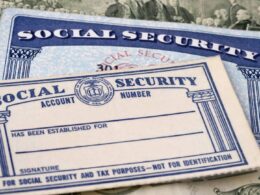U.S. President Donald Trump takes a question from a reporter during a news conference in the Roosevelt Room of the White House on January 21, 2025 in Washington, DC.
Andrew Harnik | Getty Images
Why are borrowers now at risk of wage garnishment?
How much of my wages can the government take?
The U.S. Department of Education can garnish up to 15% of your disposable, or after-tax, pay, said higher education expert Mark Kantrowitz.
By law, you must be left with at least 30 times the federal minimum hourly wage ($7.25) a week, which is $217.50, Kantrowitz said.
When could the wage garnishments start?
The Treasury Department will send notices to 5.3 million defaulted borrowers about the collection activity of their wages “later this summer,” the Education Department wrote in a recent press release.
As soon as June, the Trump administration says it will begin seizing portions of defaulted student loan borrowers’ federal benefits when applicable, including their Social Security retirement checks. (Social Security recipients can typically see up to 15% of their monthly benefit reduced to pay back their defaulted student debt, but beneficiaries need to be left with at least $750 a month.)
What if I’m self-employed, or a gig worker?
It is more difficult for the federal government to garnish the wages of someone who receives 1099 income, Kantrowitz said.
“If there is no employer, wage garnishment can’t happen,” he said.
Can I challenge the wage garnishment?
Yes.
Borrowers in default will receive a 30-day notice before their wages are garnished, a spokesperson for the Education Department told CNBC.
During that period, you should have the option to have a hearing before an administrative law judge, Kantrowitz said. The Education Department notice is supposed to include information on how you request that, he said.
Your wages may be protected if you’ve recently been unemployed, or if you’ve recently filed for bankruptcy, Kantrowitz said.
Borrowers can also challenge the wage garnishment if it will result in financial hardship, he added.
What should I tell my employer?
Most employers will already be familiar with the wage garnishment process, Kantrowitz said, “since this occurs for a variety of reasons, such as child support, alimony and unpaid taxes — not just student loans.”
Your boss is not allowed to terminate you because of the wage garnishment, Kantrowitz said.
How do I get out of default?
You can contact the government’s Default Resolution Group and pursue a number of different avenues to get current on your loans, including enrolling in an income-driven repayment plan or signing up for loan rehabilitation.
Some borrowers may also be eligible for deferments or a forbearance, which are different ways to pause your payments, said Carolina Rodriguez, director of the Education Debt Consumer Assistance Program in New York, in an earlier interview with CNBC.
“We’re advising clients to request a retroactive forbearance to cover missed payments, and a temporary forbearance until they can get enrolled in an income-driven repayment plan,” she said.
Source link









